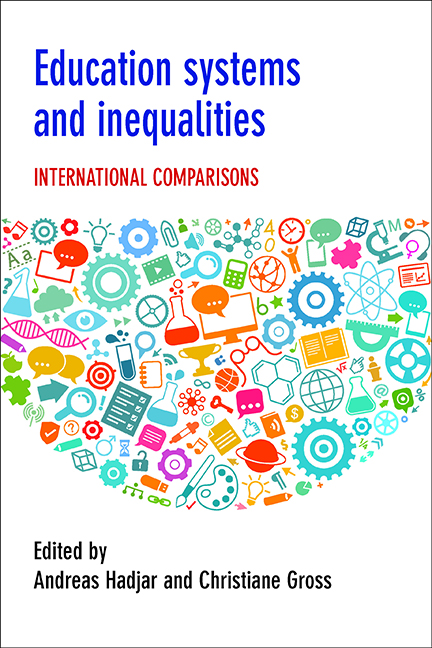Book contents
- Frontmatter
- Contents
- List of tables and figures
- Notes on contributors
- Acknowledgements
- Introduction: education systems and inequalities
- one Theorising the impact of education systems on inequalities
- two Comparing education policies in a globalising world: methodological reflections
- three Education systems and intersectionality
- four Measuring educational institutional diversity: tracking, vocational orientation and standardisation
- five Sorting and (much) more: prior ability, school effects and the impact of ability tracking on educational inequalities in achievement
- six Data analysis techniques to model the effects of education systems on educational inequalities
- seven Education systems and inequality based on social origins: the impact of school expansion and design
- eight Education systems and gender inequalities in educational attainment
- nine Tracking, school entrance requirements and the educational performance of migrant students
- ten From exclusion and segregation to inclusion? Dis/ability-based inequalities in the education systems of Germany and Nigeria
- eleven Education systems and meritocracy: social origin, educational and status attainment
- twelve Education systems and gender inequalities in educational returns
- thirteen Education systems and migrant-specific labour market returns
- fourteen Health returns on education and educational systems
- fifteen Good and bad education systems: is there an ideal?
- Conclusions and summary
- Index
three - Education systems and intersectionality
Published online by Cambridge University Press: 05 April 2022
- Frontmatter
- Contents
- List of tables and figures
- Notes on contributors
- Acknowledgements
- Introduction: education systems and inequalities
- one Theorising the impact of education systems on inequalities
- two Comparing education policies in a globalising world: methodological reflections
- three Education systems and intersectionality
- four Measuring educational institutional diversity: tracking, vocational orientation and standardisation
- five Sorting and (much) more: prior ability, school effects and the impact of ability tracking on educational inequalities in achievement
- six Data analysis techniques to model the effects of education systems on educational inequalities
- seven Education systems and inequality based on social origins: the impact of school expansion and design
- eight Education systems and gender inequalities in educational attainment
- nine Tracking, school entrance requirements and the educational performance of migrant students
- ten From exclusion and segregation to inclusion? Dis/ability-based inequalities in the education systems of Germany and Nigeria
- eleven Education systems and meritocracy: social origin, educational and status attainment
- twelve Education systems and gender inequalities in educational returns
- thirteen Education systems and migrant-specific labour market returns
- fourteen Health returns on education and educational systems
- fifteen Good and bad education systems: is there an ideal?
- Conclusions and summary
- Index
Summary
Introduction
Education remains one of the most important determinants of social inequalities across generations and the life course, and educational systems are the main places for generating these disparities (see Coleman et al, 1966; Boudon, 1974; Bourdieu, 1986; Barone and Schizzerotto, 2011). Empirical research into education identifies particular social groups that are particularly at risk of poor performance in various educational systems. Being male, being from migrant backgrounds and the lower social classes have repeatedly been found to be disadvantageous for the attainment of educational qualifications; by themselves, however, none of these axes of inequality are sufficient to explain educational disparities. Instead, they operate simultaneously and are mutually constitutive (Gillborn and Mirza, 2000). The concept of intersectionality helpfully emphasises this simultaneity. From an intersectional point of view, social inequality is not only determined multidimensionally along different axes of inequality – such as gender, migration, socioeconomic background, age, disability and so on – but emerges particularly in the intersection of these axes as they mutually constitute each other within social contexts such as the family, school or the labour market.
This chapter analyses the ways in which intersectionality advances understandings of educational systems and educational inequalities. Our contribution is structured as follows. The next section briefly introduces the concept of intersectionality and gives an overview of current quantitative and qualitative empirical educational research which investigates the effects of the interplay of gender, migration and class on educational outcomes. The following section shows how an intersectionality approach can be applied to qualitative and quantitative research to understand educational systems and educational inequalities. It evaluates the strengths and weaknesses of each perspective and includes a section on qualitative comparative analysis (QCA), since this relatively new method fits well with intersectional theorisation and quantitative approaches. The concluding section suggests that future educational research could make greater use of mixed-method designs to enhance the strengths and minimise the weaknesses of each approach.
An intersectionality perspective on educational systems and educational inequalities
Intersectionality approach
The vast number of intersectionality-related publications from different disciplines shows that the concept of intersectionality currently enjoys high popularity, integrating different strands of gender research, queer, migration and inequality research, as well as different theoretical perspectives (for example, constructivist, deconstructivist and socio-structural) (McCall, 2005; Collins and Chepp, 2013).
- Type
- Chapter
- Information
- Education Systems and InequalitiesInternational Comparisons, pp. 51 - 72Publisher: Bristol University PressPrint publication year: 2016
- 3
- Cited by

